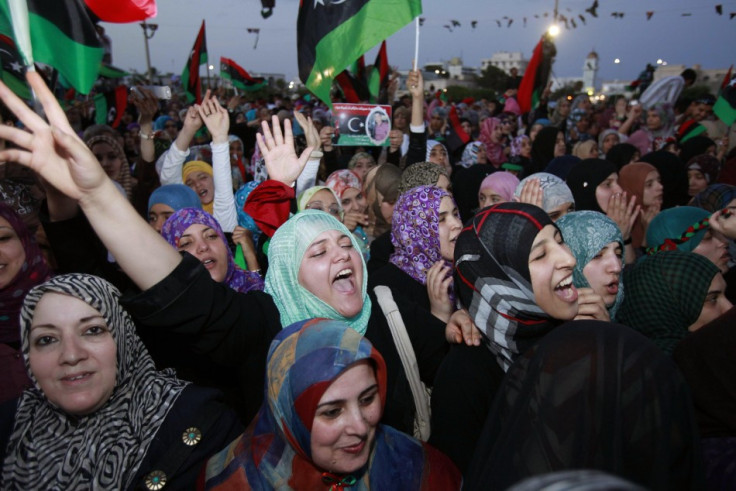Libya Lifts Ban on Polygamy as Fears Grow of an Islamic State

The announcement that the new Libyan state will be based on Sharia law and the lifting of the ban on polygamy have put the Western countries that supported the NATO mission in Libya and the National Transitional Council in an uncomfortable position.
While claiming for months that efforts for the reconstruction of Libya would focus on the establishment of a democratic state with respect for human rights, the NTC forgot to emphasise the prevalence of the Sharia law in their vision of a "new" Libya.
In August, Ali Aujali, the former Libyan ambassador to the United States who defected from the Gaddafi regime to support the NTC, said Libya would not become an Islamic state. "As for the talk that Libya will become an Islamic state, this is the talk that Gaddafi used to say," Aujali said in an interview with Reuters. "There is no room for extremism in Libya."
After overthrowing the former regime, however, it seems the NTC has decided there is room for an Islamic-based state after all.
After the official announcement of the liberation of Libya, NTC leader Mustafa Abdul-Jalil revealed that Sharia law would be at the base of the new state and immediately lifted by decree, one law put in place by the Gaddafi regime, which he said was in conflict with Sharia, by revoking the ban on polygamy.
"We as a Muslim nation have taken Islamic Sharia as the source of legislation, therefore any law that contradicts the principles of Islam is legally nullified. This includes changing marriage laws to allow men to more easily take on a second wife."
Proving that Libya is set on following Muslim guidelines, even when it comes to economic policies, the leader also announced that in the future bank regulations would ban the charging of interest, in line with Sharia. "Interest creates disease and hatred among people," he said.
What is perhaps most disturbing about Abdul-Jallil's move is that the NTC has not been elected and such measures should be voted after the introduction of the new constitution enshrining the rights of the Libyan people.
Drafts of the constitution affirm the NTC's will to respect the rule of law, freedom of speech and religious practice, and a multi-party electoral system, but the document also states that "Islam is the religion of the state, and the principal source of legislation is Islamic jurisprudence," i.e. Sharia.
The interpretation of Sharia, which means "the way of God's law," differs from country to country, and the NTC moves does not mean that Libya is about to become a theocracy.
The restoration of polygamy, however, raises questions as it was one of the first act of the NTC following the liberation of Libya, but was not one of the main demands of the protesters that started the uprising against Gaddafi.
It also brings about concern for the future of womens' rights as when Sharia law is applied to families it governs marriage, divorce and child support and custody.
While the fact that NATO lent its support to the rebellion after a U.N. resolution did not mean the new Libyan leaders should have designed the new government on a Western secularist model, the announcement of the rule of Sharia was said to have embarrassed the coalition partners involved in the Libyan operation.
Soon after the news, Alain Juppe, the French foreign minister, said France would have to remain "vigilant."
This week, despite repeated calls from the NTC and its ally Qatar to stay, NATO Thursday announced it will end the Libyan operation on Monday.
The U.N. Security Council unanimously passed a resolution that will terminate the no-fly zone and civilian protection mandates prescribed by Resolution 1973, adopted on March 17 to support the rebels.
Resolution 2016, submitted by Russia and Britain and approved by all 15 council members, praised "the positive developments in Libya which will improve the prospects for a democratic, peaceful and prosperous future there."
However, NATO Secretary-General Anders Fogh Rasmussen said in Berlin Thursday that NATO still expects to play a role in the country in the post-conflict period.
"If requested we can assist the new Libyan government in the transformation to democracy, for instance with defence and security sector reform, but I wouldn't expect new tasks beyond that," he said at a press conference.
It appears that the alliance is in a hurry to wrap up its operation, and while financial costs might have weighed in the decision to terminate the mission, the NTC's announce that the "new" Libya will use Sharia as the basis for law has put the Western countries that backed the revolution in an uneasy position.
Allegations of war crimes by the NTC fighters and the gruesome footages of Gaddafi being beaten up and assaulted have also tarnished the reputation of the NTC.
The death of Gaddafi is also controversial as while initial reports said he was captured alive but killed in crossfire, new evidence suggests the dictator was killed by his captors.
International pressure has pushed the NTC to announce the launch of an investigation into the death of Gaddafi but various rights organisation have called for an independent rather than Libyan-led inquiry, proving confidence in the new regime is rapidly sliding away.
© Copyright IBTimes 2025. All rights reserved.





















